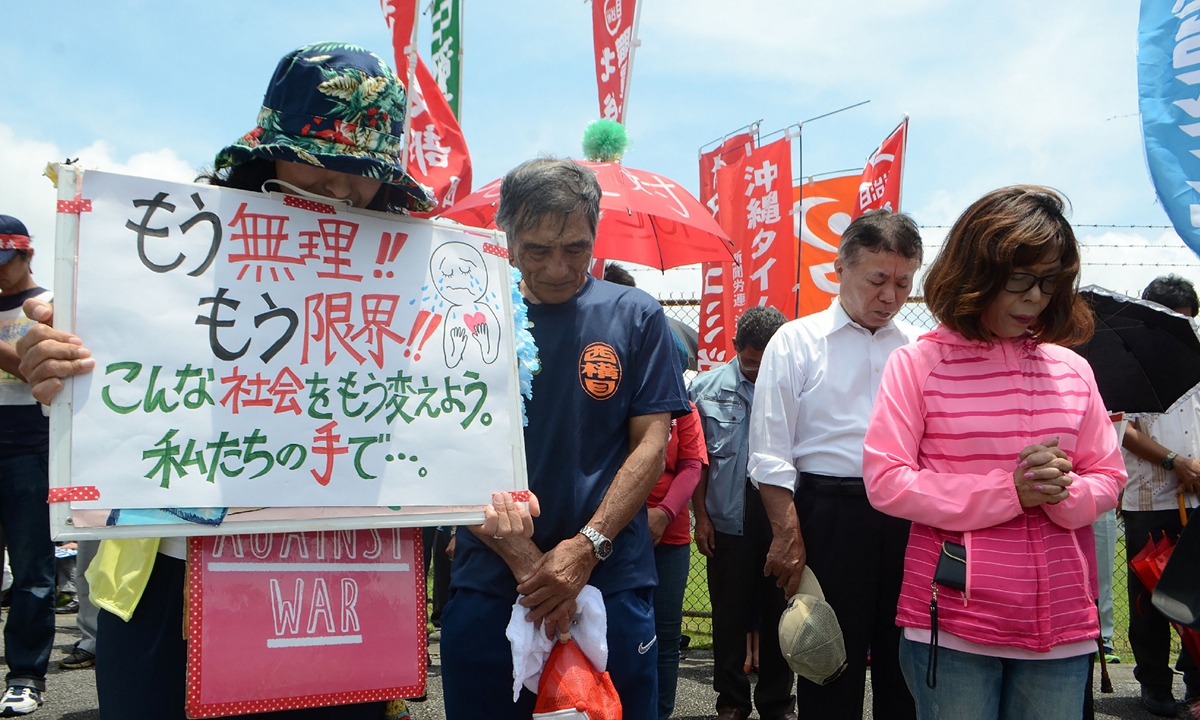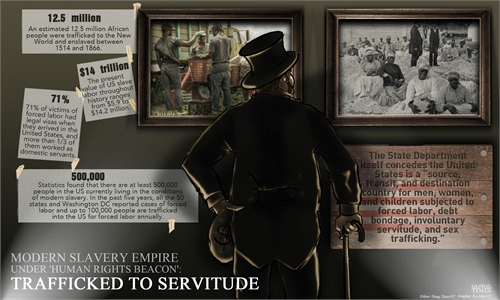IN-DEPTH / IN-DEPTH
Indentured by hegemony - US builds slavery empire by exploiting other countries
GT investigates: Long-lasting exploitation - how US reaps global fortune

Photo: VCG
Editor's Note:
Inmates in prisons are subject to labor exploitation, minors working as child laborers are abused, and human trafficking remains rampant in the US. Today, more than 150 years after the abolition of slavery in the country, these problems still exist. Some American politicians have created a narrative of "forced labor" in China's Xinjiang region, but a lie repeated a thousand times is still a lie. It is the US, a self-proclaimed "human rights defender" or "beacon of freedom" that should be accused of using forced labor, which plainly demonstrates the US' real disregard for basic human rights and its brutal exploitation of the country's workforce.
The Global Times is publishing a series of stories that will uncover the crimes of the US, a real "contemporary slavery empire." The following is the fourth and last installment in the series.
Exploiting natural resources of developing countries, seeking cheap labor globally, turning countries as markets to dump its products, setting dollar supremacy to hijack other countries, and starting coups, wars or color revolutions or imposing sanctions on countries that do not cooperate … using the US dollar, weapons and alliances, the US is building a modern empire globally by enslaving more countries to serve its own interests. This greedy face of the US has been exposed by analysts globally.
American economist Michael Hudson published a book in 1972 revealing how the US had shaped the dollar-dominated world economy, forced other nations to pay for its wars, defaulted on its debts, and exploited developing economies via what Hudson called "monetary imperialism."
How the US' "food imperialism" works in Latin America is an example. Describing his book, Super Imperialism, in an interview with US news website The Grayzone, Hudson explained how the US, by manipulating the World Bank, did not make any loans to Chile or Venezuela or others in Latin America to increase their own food supply but to grow crops that are needed but cannot be grown in the US.
"We want to develop your agriculture, but we will only develop export crops because you are a tropical country with goods that can be exported, that we can't grow in the US, palm oil or whatever, coffee, bananas. We're going to promote plantation crops, not food supply, so that countries have become more and more dependent on the US for food," said Hudson.
Shaping agriculture in Latin American countries is a small part of the US' plan for financially dominating the region but it also shows how the US is building modern slavery empire globally, analysts said.
Latin American countries have experienced exploitation by the US as it has influenced their economies to help fix issues in the US economic structure, Sun Yanfeng, a research fellow at the Institute of Latin American Studies of the China Institutes of Contemporary International Relations, told the Global Times.
During this process, US companies such as United Fruit Company (UFC), have played a shameful role. Formed in 1899, the US multinational enterprise UFC gradually took control of the economic lifelines of many countries in Central America and the Caribbean coast of Colombia, turning countries such as Guatemala, Honduras and Nicaragua into "banana republics" - a disdainful term for poor, developing countries that relied on single cash crops such as bananas.
According to data from educational materials developed through the Baltimore County History Labs Program, in the 1930s, "under the Guatemalan dictator Jorge Ubico, UFC gained control of 42 percent of Guatemala's land, and was exempted from paying taxes and import duties; 77 percent of all Guatemalan exports went to the US, and 65 percent of imports to the country came from the US. The UFC was, essentially, a state within the Guatemalan state. It not only owned all of Guatemala's banana production and monopolized banana exports, it also owned the country's telephone and telegraph system, and almost all of its railroad tracks."

People offer a silent prayer in front of the US Kadena Air Base in Cyatan to protest against the US military presence in Okinawa on May 21, 2016, after a former US Marine reportedly admitted to raping and killing a Japanese female. Photo: VCG
Moreover, UFC was also known for its racial politics in the workplace, including pitting employees from different racial groups against one another to control revolts in the company, media reports said.
The plantation economy that the US implemented in Latin America had a deep and long-lasting negative impact on the economic and political development of the Latin American countries, especially those described as "the banana republics." Relying on a single tropical cash crop resulted in an inability to develop industries independently, and reliance on exports to developed markets also stunted their economic development, Sun said.
The economic structure of Latin America has been dominated by exports of raw materials and imports of industrial products since independence 200 years ago. The industrialization level of the region itself is relatively low, especially in the recent 30 years of the neoliberal globalization model, Sun explained.
What the US has done in Latin American countries demonstrates how it exploits other countries to benefit its own development and how it used military and political methods to maintain dominance when being challenged. For example, on June 17, 1954, with the support of the US government and the CIA, the company launched an invasion, leading to an era of human rights violations against Guatemalans.
The US is unable to promote economic recovery and growth in Latin America, and has no way to provide Latin American countries with preferential investment plans and policies, Sun said, adding that the US hopes to restore its past "resplendence" in this region by establishing new mechanisms and platforms, so as to offset the economic and trade exchanges and the growing influence of other countries, especially China and Russia.
Pressure on competitors
US allies usually benefited from the US exploitation of developing countries but if they get in the way of US hegemony, they will also face a tough response. Japan knows this well.
In the 1980s, facing an increasing financial deficit and adverse trade balance, the US wanted to boost its exports, so it forced Japan to sign the Plaza Accord to depreciate the US dollar relative to the Japanese yen. Analysts believe this is the main reason for economic bubbles and slow growth in Japan in the following decades.
Also in the 1980s, when the US semiconductor industry had more than 50 percent of the global market, the US government took a series of actions to protect this dominance. In 1982, it arrested employees of Japanese electronics giant Hitachi for "stealing IBM technologies." The Reagan administration repeatedly accused Japan of dumping goods and stealing intellectual property, and forced Japan to sign a semiconductor agreement.
In 1987, the US accused electronics firm Toshiba of selling machines to the Soviet Union and later issued a two-to-five-year ban on all its products.
Two of Toshiba's managers were sent to jail and several senior executives resigned. The company spent some 100 million yen ($0.95 million) on advertising in almost all major US newspapers apologizing for its actions. The scandal ended up damaging its reputation globally. Many of its technical documents were also allegedly seized during a CIA investigation. This prompted Japanese semi-conductor companies to withdraw from the US.
Washington's selective targeting of Toshiba was not just motivated by so-called national security concerns. Toshiba was seen as a threat to the development of US tech firms. The US reached its goal of protecting its domestic chip industry by suppressing its biggest rivals, Song Guoyou, deputy director of the Center for American Studies at Fudan University, told the Global Times in a previous interview.
Monetary imperialism
Paralyzing other countries' economies for its own benefit and attacking global competitors are not the only methods the US has used. The country has also developed its own monetary imperialism.
After World War II, thanks to the Bretton Woods Agreement, the US dollar became the world's reserve currency and was backed by the world's largest gold reserves. And after Richard Nixon de-linked the dollar from gold in 1971, the US dollar remained the world's reserve currency. Later, the US dollar was linked with oil, allowing for dollar-dominated hegemony.
Analysts pointed out that similar to Latin America, the US used wars and political coups to destabilize the Middle East and grasp pricing power over oil from producers in the region. Given the significance of oil, the US sought a measure of control over it in the global economy so that it could impose sanctions on new emerging economies or countries that it considered "enemies."
Sun Lipeng, an expert at the China Institutes of Contemporary International Relations, pointed out that the dollar-dominated international monetary system also gives the US numerous benefits and advantages, such as pricing power over raw materials.
Buying resources from Africa, the Middle-East and Asia, finding countries with cheap labor for manufacturing and later selling products with higher prices in emerging economies, the US can earn more profits, Sun said.
As US dollars are the world's currency, these countries use the money they earn to buy US Treasury bonds for foreign exchange reserves, which means money goes back to the US and the US can also transfer its domestic financial crisis by issuing more bonds to other countries, the expert noted.
For example, to deal with the pandemic, the US printed more money, which led to severe inflation and since June 1, the Federal Reserve has started shrinking its $8.9 trillion balance sheet, which observers warned would lead to capital outflows and currency devaluation in new emerging economies, and therefore destabilize global economy.
For years, the US' greenback hegemony has created a middle-income trap in Latin America and financial crises in Southeast Asia. It has also deepened global poverty and inequality.



